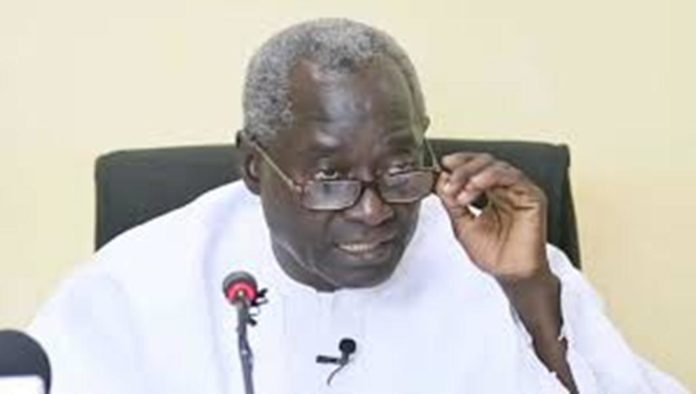BY HALIFA SALLAH, PART 10
How are Muslim and Christian faiths catered for in the 1997 Constitution? Are the safeguards adequate or inadequate? What reforms are relevant to faith-based groups? What is the way forward in Constitution building in terms of balancing the powers of religion and the powers of the state?
Having established without any doubt that the 1997 Constitution is a mundane Constitution which separates the powers of religion from the powers of the state by barring any religion from being established as a state religion under Section 100 or any party to be formed or organised on an ethnic, sectional, religious or regional basis as stipulated under Section 60 it is now necessary to show how the rights to religious belief and practice is protected under the Constitution.
Section 33 starts with Protection from discrimination. It states:
“(1) All persons shall be equal before the law.
(2) Subject to the provisions of subsection (5), no law shall make any provision which is discriminatory either of itself or in its effect.
(3) Subject to the provisions of subsection (5), no person shall be treated in a discriminatory manner by any person acting by virtue of any law or in the performance of the functions of any public office or any public authority.
(4) In this section, the expression “discrimination” means affording different treatment to different persons attributable wholly or mainly to their respective descriptions by race, colour, gender, language, religion, political or other opinion, national or social origin, property, birth or other status whereby persons of one such description are subjected to disabilities or restrictions to which persons of another such description are not made subject, or are accorded privileges or advantages which are not accorded to persons of another such description.
(5) Subsection (2) shall not apply to any law in so far as that law makes provision –
(c) with respect to adoption, marriage, divorce, burial, devolution of property on death or other matters of personal law;”
It is important to note that religions have their own group laws. Since people have power to choose not to belong to religions it is not seen to be an act of discrimination if one chooses to belong to a religion which dictates how one is to get married, divorce, be buried or inherited after death.
These personal laws are often embodied in Acts such as the Christian Marriages Act, Muslim Marriage and Divorce Act, etc. The 1997 Constitution went further to indicate in Section 7 what constitutes the laws of the Gambia as follows:
“In addition to this Constitution, the laws of The Gambia consist of –
(a) Acts of the National Assembly made under this Constitution and subsidiary legislation made under such Acts;
(b) any orders, rules, regulations subsidiary legislation made by a authority under a power conferred Constitution or any other law;
( c) the existing laws including all decrees passed by the Armed Forces Provisional Ruling Council;
(d) the common law and principles of equity;
(e) Customary law so far as it concerns members of the communities to which it applies;
(f) the sharia as regards matters of marriage, divorce and inheritance among members of the communities to which it applies.”
Here it is clear that the part of the sharia which is incorporated into the laws of the Gambia are provisions dealing with marriage, divorce and inheritance among Muslims.
It goes without saying that laws that cannot be enforced are null and void by omission. This is why courts are established under section 120 of the 1997 Constitution to administer and enforce the laws articulated under section 7.
Section 120 reads:
“(1) The Courts of The Gambia are:
(a) the Superior Courts comprising:
(i) the Supreme Court;
(ii) the Court of Appeal; and
(iii) the High Court and the Special Criminal Court; and
(b) the Magistrates Court, the Cadi Court, District Tribunals and such lower courts and tribunals as may be established by an Act of the National Assembly.
(2) The judicial power of The Gambia is vested in the courts and shall be exercised by them according to the respective jurisdiction conferred on them by law.”
Section 25 Subsection (1) (b) and (c) reiterates that:
“(1) Every person shall have the right to –
(b) freedom of thought, conscience and belief, which shall include academic freedom;
(c) freedom to practise any religion and to manifest such practice;”
Section 32 reinforces the right to practise religion as part of cultural rights in the following words:
“Every person shall be entitled to enjoy, practise, profess, maintain and promote any culture, language, tradition or religion subject to the terms of this Constitution and to the condition that the rights protected by this section do not impinge on the rights and freedoms of others or the national interest, especially unity.”
Hence, the mundane Constitution and the Acts under it such as the Criminal Code aim to protect the right to practice, profess, maintain and promote religion.
Needless to say, the rights accorded by the Mundane Constitution is often misconceived to be a source of immorality. However, Subsection (4) of Section 25 adds :
“(4) The freedoms referred to in subsections (1) and (2) shall be exercised subject to the law of The Gambia in so far as that law imposes reasonable restrictions on the exercise of the rights and freedoms thereby conferred, which are necessary in a democratic society and are required in the interests of the Sovereignty and integrity of The Gambia, national security, public order, decency or morality, or in relation to contempt of court.”
One may now ask: Are these provisions adequate to protect faith based groups in the Gambia? This is what members of such groups should have asked as they participated in the Constitution building exercise. The Demagogue however turned the whole thing into a contest between religions and an aggressive mudslinging exercise.
To be continued Part 11 https://foroyaa.net/the-lessons-of-gambian-constitutional-development/




















